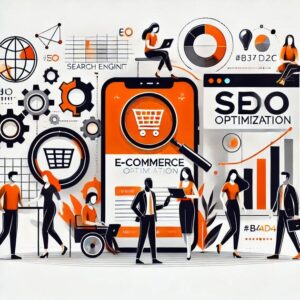SEO services for e-commerce websites are crucial for businesses looking to thrive in the competitive online marketplace. As more consumers turn to online shopping, having a strong digital presence is no longer optional—it’s essential. In this comprehensive guide, we’ll explore how professional SEO services can transform your e-commerce website, driving traffic, increasing conversions, and ultimately boosting your bottom line.
The Importance of SEO Services for E-Commerce Websites
In today’s digital landscape, e-commerce businesses face fierce competition. To stand out and succeed, implementing effective SEO strategies is paramount. Let’s delve into why SEO services are so vital for online stores:
Enhancing Search Engine Visibility
Professional SEO services employ advanced techniques to improve your website’s ranking on search engine results pages (SERPs). This increased visibility makes it easier for potential customers to find your products when searching online. By maximizing your online visibility with expert SEO services, you can stay ahead of the competition and attract more qualified traffic to your e-commerce site.
Driving Organic Traffic
By optimizing your website for relevant keywords and implementing SEO best practices, you can attract a steady stream of organic traffic. This reduces your reliance on paid advertising and provides a more sustainable approach to customer acquisition. Mastering SEO strategies for unrivaled online visibility is key to achieving long-term success in the e-commerce space.
Boosting Conversion Rates
A well-optimized e-commerce website not only attracts more visitors but also ensures that these visitors are more likely to convert into customers. This leads to higher sales and revenue for your business. Effective SEO services can help improve user experience, site speed, and overall performance, all of which contribute to better conversion rates.
Key Elements of Successful SEO for E-Commerce Websites
To achieve optimal results, SEO services for e-commerce websites focus on several critical elements:
On-Page Optimization for Product Pages
- Keyword Research and Targeting: Conduct thorough keyword research to identify high-value terms relevant to your products and target audience.
- Unique Product Descriptions: Craft compelling, original product descriptions that provide value to both customers and search engines.
- Image Optimization: Ensure all product images have descriptive filenames, alt text, and captions to enhance visibility in image search results.
Effective Use of Meta Tags and Content Structure
- Meta Titles and Descriptions: Create enticing meta titles and descriptions that accurately reflect page content while incorporating targeted keywords.
- Heading Tag Optimization: Structure content with relevant heading tags (H1, H2, etc.) to improve readability and signal importance to search engines.
- Structured Data Markup: Implement Schema.org markup to provide search engines with additional context about your products, potentially resulting in rich snippets in search results.
Link Building and Internal Linking Strategies
- Natural Link Acquisition: Focus on acquiring high-quality backlinks from authoritative websites within your industry to enhance credibility and domain authority.
- Strategic Internal Linking: Develop a logical internal linking structure that connects related product pages, category pages, and informational content.
- SEO-Friendly URLs: Optimize URLs by incorporating relevant keywords and maintaining a logical hierarchy to improve crawlability and user experience.
Leveraging Social Media and Content Marketing for SEO Success
Integrating social media and content marketing into your SEO strategy can significantly amplify your e-commerce website’s visibility and engagement. Here’s how:
Social Media Integration for Brand Visibility
- Active Social Presence: Maintain a consistent presence on popular platforms like Facebook, Instagram, and Twitter to engage with your audience and showcase products.
- Shareable Content: Create compelling content that resonates with your target audience, encouraging social shares and increasing brand awareness.
- User-Generated Content: Encourage customers to share their experiences with your products on social media, building credibility and trust among potential buyers.
Creating Engaging Content for Audience Retention
- Blog Posts and Articles: Develop informative content that addresses common questions or pain points related to your products, attracting organic traffic and establishing thought leadership.
- Visual Content: Utilize infographics, videos, and product demos to captivate your audience and drive engagement on social media platforms.
- Interactive Content: Incorporate quizzes, polls, and interactive product showcases to encourage user interaction and increase time spent on your website.
To learn more about effective content marketing strategies, check out our guide on mastering data-driven content for digital marketing success.
Monitoring and Adapting SEO Strategies for Continuous Growth
To ensure sustained success, it’s essential to consistently monitor, analyze, and adapt your SEO strategies. Here’s how to stay ahead of the curve:
Regular Site Audits and Performance Tracking
- SEO Audits: Conduct comprehensive audits to identify technical issues, on-page optimizations, and potential areas for improvement.
- Performance Metrics: Monitor key performance indicators (KPIs) such as organic traffic, conversion rates, and keyword rankings to gauge the effectiveness of your SEO initiatives.
- User Experience Analysis: Evaluate user behavior metrics like time on site and navigation paths to understand how visitors interact with your website.
Utilizing Analytics for Measuring Success
- Google Analytics: Leverage this powerful tool to track website traffic, user demographics, and behavioral data, gaining insights into the effectiveness of your SEO campaigns.
- Google Search Console: Monitor your website’s performance in search results, identify indexing issues, and receive alerts about potential problems affecting your site.
- Custom Reporting: Create tailored reports that align with your business goals, focusing on key SEO metrics to inform strategic decisions.
Proactive SEO Strategies to Stay Competitive
- Competitor Analysis: Regularly benchmark your SEO performance against industry peers to identify emerging trends and capitalize on untapped opportunities.
- Algorithm Updates: Stay informed about major search engine algorithm updates and proactively adjust your strategies to mitigate any negative impacts on your website’s visibility.
- Continuous Learning: Embrace a culture of ongoing experimentation and adaptation, testing new SEO techniques to stay ahead in the ever-evolving digital landscape.
For more insights on staying ahead in the digital marketing realm, explore our article on digital marketing trends for 2024.
Advanced SEO Tactics for E-Commerce Success
To truly excel in the competitive e-commerce space, consider implementing these advanced SEO tactics:
Harnessing Structured Data Markup
- Schema.org Integration: Implement Schema markup to provide search engines with structured data about your products, enhancing the visibility of rich snippets in search results.
- Product Schema Implementation: Utilize Product schema to highlight specific details such as brand, color, size, and reviews, making your product listings more informative and appealing.
- FAQPage Schema Usage: Incorporate FAQPage schema to address common queries directly in search results, increasing the likelihood of capturing featured snippets.
Dynamic and Personalized Content Optimization
- Dynamic Product Recommendations: Implement personalized recommendation widgets based on user behavior and preferences to enhance cross-selling opportunities.
- Dynamic Pricing Strategies: Leverage dynamic pricing based on factors such as demand and competition to optimize conversions and profitability.
- AI-Powered Content Generation: Explore AI tools for content creation to scale your efforts and improve search engine visibility with high-quality, relevant content.
Voice Search Optimization and Featured Snippets
- Voice Search Optimization: Focus on conversational keywords and long-tail phrases to cater to the growing trend of voice-activated search assistants.
- Featured Snippet Optimization: Target featured snippet opportunities by answering common questions concisely on your product pages and blog posts.
Comparison of SEO Tactics for E-Commerce Websites
| SEO Tactic | Benefits | Challenges |
|---|---|---|
| On-Page Optimization | Improves relevance and targeting | Requires ongoing maintenance |
| Link Building | Enhances domain authority | Time-consuming and resource-intensive |
| Content Marketing | Drives organic traffic and engagement | Demands consistent high-quality content creation |
| Technical SEO | Improves crawlability and indexing | May require developer assistance |
| Local SEO | Boosts visibility for local searches | Limited impact for purely online businesses |
ROI of Professional SEO Services for E-Commerce
| Metric | Average Improvement | Timeframe |
|---|---|---|
| Organic Traffic | 50-200% increase | 6-12 months |
| Conversion Rate | 10-50% improvement | 3-6 months |
| Revenue Growth | 20-100% increase | 6-18 months |
| Cost per Acquisition | 30-70% decrease | 3-9 months |
| Search Engine Rankings | 5-20 position improvement | 3-12 months |
To learn more about maximizing your e-commerce success through expert SEO strategies, check out our guide on maximizing your e-commerce success with expert SEO strategies.
The Future of SEO for E-Commerce Websites
As technology continues to evolve, so do the strategies for optimizing e-commerce websites. Here are some emerging trends to keep an eye on:
AI and Machine Learning in SEO
Artificial Intelligence and Machine Learning are increasingly being used to analyze vast amounts of data and provide insights for SEO optimization. These technologies can help predict search trends, automate content creation, and personalize user experiences at scale.
Visual Search Optimization
With the rise of visual search tools like Google Lens, optimizing product images for visual search is becoming crucial. This includes using high-quality images, relevant alt text, and descriptive file names to improve visibility in image search results.
Mobile-First Indexing
As more users shop on mobile devices, Google has shifted to mobile-first indexing. Ensuring your e-commerce site is fully optimized for mobile devices is no longer optional but essential for SEO success.
E-A-T (Expertise, Authoritativeness, Trustworthiness)
Google’s emphasis on E-A-T factors continues to grow, especially for e-commerce sites. Demonstrating expertise in your product niche, building brand authority, and fostering trust through customer reviews and secure transactions are crucial for long-term SEO success.
Integrating SEO with Other Digital Marketing Strategies
For maximum impact, SEO services for e-commerce websites should be integrated with other digital marketing strategies. This holistic approach can lead to synergistic benefits and improved overall performance.
SEO and PPC Integration
Combining SEO with Pay-Per-Click (PPC) advertising can provide valuable insights into keyword performance and help you dominate search results. Use PPC data to inform your SEO strategy and vice versa for a more effective overall search marketing approach.
Email Marketing and SEO
Leverage your email list to promote SEO-optimized content, driving traffic to your website and potentially improving engagement metrics, which can indirectly benefit your SEO efforts.
Social Media and SEO Synergy
While social media signals aren’t direct ranking factors, a strong social media presence can indirectly benefit your SEO by increasing brand awareness, driving traffic, and potentially leading to more backlinks.
As the digital landscape continues to evolve, staying ahead in the e-commerce SEO game is crucial for long-term success. By implementing these strategies and working with professional SEO services, you can significantly boost your online visibility, attract more qualified traffic, and drive sustainable growth for your e-commerce business.
For an external perspective on the importance of SEO for e-commerce, check out this comprehensive guide from Moz on E-commerce SEO.
Ready to take your e-commerce website to the next level with professional SEO services? Contact Nesace Media today for a personalized consultation and discover how we can help you achieve your online business goals.




